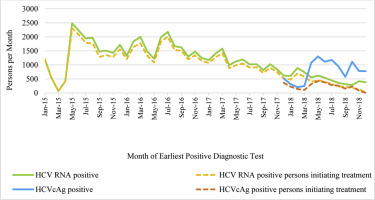当前位置:
X-MOL 学术
›
J. Hepatol.
›
论文详情
Our official English website, www.x-mol.net, welcomes your feedback! (Note: you will need to create a separate account there.)
Progress and Challenges in a Pioneering Hepatitis C Elimination Program in the Country of Georgia, 2015–2018
Journal of Hepatology ( IF 25.7 ) Pub Date : 2020-04-01 , DOI: 10.1016/j.jhep.2019.11.019 Francisco Averhoff 1 , Shaun Shadaker 1 , Amiran Gamkrelidze 2 , Tatia Kuchuloria 3 , Lia Gvinjilia 3 , Vladimer Getia 2 , David Sergeenko 4 , Maia Butsashvili 5 , Tengiz Tsertsvadze 6 , Lali Sharvadze 7 , Jaba Zarkua 8 , Beth Skaggs 9 , Muazzam Nasrullah 1
Journal of Hepatology ( IF 25.7 ) Pub Date : 2020-04-01 , DOI: 10.1016/j.jhep.2019.11.019 Francisco Averhoff 1 , Shaun Shadaker 1 , Amiran Gamkrelidze 2 , Tatia Kuchuloria 3 , Lia Gvinjilia 3 , Vladimer Getia 2 , David Sergeenko 4 , Maia Butsashvili 5 , Tengiz Tsertsvadze 6 , Lali Sharvadze 7 , Jaba Zarkua 8 , Beth Skaggs 9 , Muazzam Nasrullah 1
Affiliation

|
BACKGROUND & AIMS
Georgia, with a high prevalence of hepatitis C virus (HCV) infection, launched the world's first national hepatitis C elimination program in April 2015. A key strategy is the identification, treatment, and cure of the estimated 150,000 HCV infected persons living in the country. We report on progress and key challenges from Georgia's experience. METHODS
We constructed a care cascade by analyzing linked data from the national hepatitis C screening registry and treatment databases during 2015-2018. We assessed the impact of reflex hepatitis C core antigen (HCVcAg) testing on rates of viremia testing and treatment initiation (i.e. linkage to care). RESULTS
As of December 31, 2018, 1,101,530 adults (39.6% of the adult population) were screened for HCV antibody, of whom 98,430 (8.9%) tested positive, 78,484 (79.7%) received viremia testing, of these, 66,916 persons (85.3%) tested positive for active HCV infection. A total of 52,576 persons with active HCV infection initiated treatment, 48,879 completed their course of treatment. Of the 35,035 who were tested for cure (i.e., sustained virologic response [SVR]), 34,513 (98.5%) achieved SVR. Reflex HCVcAg testing, implemented in March 2018, increased rates of monthly viremia testing among persons screening positive for anti-HCV by 97.5%, however, rates of treatment initiation decreased by 60.7% among diagnosed viremic patients. CONCLUSIONS
Over one-third of persons living with HCV in Georgia have been detected and linked to care and treatment, however, identification and linkage to care of the remaining persons with HCV infection is challenging. Novel interventions, such as reflex testing with HCVcAg can improve rates of viremia testing, but may result in unintended consequences, such as decreased rates of treatment initiation. Linked data systems allow for regular review of the care cascade, allowing for identification of deficiencies and development of corrective actions.
中文翻译:

2015-2018 年佐治亚州开创性丙型肝炎消除计划的进展和挑战
背景与目标 丙型肝炎病毒 (HCV) 感染率高的格鲁吉亚于 2015 年 4 月启动了世界上第一个国家丙型肝炎消除计划。一项关键战略是识别、治疗和治愈估计 150,000 名生活在在国内。我们根据格鲁吉亚的经验报告进展和主要挑战。方法 我们通过分析 2015-2018 年国家丙型肝炎筛查登记处和治疗数据库的关联数据构建了护理级联。我们评估了反射性丙型肝炎核心抗原 (HCVcAg) 检测对病毒血症检测率和治疗开始率(即与护理的联系)的影响。结果截至 2018 年 12 月 31 日,1,101,530 名成年人(占成年人口的 39.6%)接受了 HCV 抗体筛查,其中 98,430 人(8.9%)呈阳性,78,484 人(79.9%)呈阳性。7%) 接受了病毒血症检测,其中 66,916 人 (85.3%) 检测出活动性 HCV 感染呈阳性。共有 52,576 名活动性 HCV 感染者开始治疗,48,879 人完成了疗程。在接受治愈测试(即持续病毒学应答 [SVR])的 35,035 人中,34,513 人(98.5%)达到了 SVR。2018 年 3 月实施的反射性 HCVcAg 检测使抗 HCV 筛查呈阳性的人的每月病毒血症检测率提高了 97.5%,但诊断出的病毒血症患者的治疗开始率下降了 60.7%。结论 佐治亚州超过三分之一的 HCV 感染者已被发现并与护理和治疗相关联,但是,识别剩余的 HCV 感染者并与护理相关联是具有挑战性的。新的干预措施,例如使用 HCVcAg 进行反射检测可以提高病毒血症检测率,但可能会导致意想不到的后果,例如降低治疗开始率。关联数据系统允许定期审查护理级联,从而识别缺陷并制定纠正措施。
更新日期:2020-04-01
中文翻译:

2015-2018 年佐治亚州开创性丙型肝炎消除计划的进展和挑战
背景与目标 丙型肝炎病毒 (HCV) 感染率高的格鲁吉亚于 2015 年 4 月启动了世界上第一个国家丙型肝炎消除计划。一项关键战略是识别、治疗和治愈估计 150,000 名生活在在国内。我们根据格鲁吉亚的经验报告进展和主要挑战。方法 我们通过分析 2015-2018 年国家丙型肝炎筛查登记处和治疗数据库的关联数据构建了护理级联。我们评估了反射性丙型肝炎核心抗原 (HCVcAg) 检测对病毒血症检测率和治疗开始率(即与护理的联系)的影响。结果截至 2018 年 12 月 31 日,1,101,530 名成年人(占成年人口的 39.6%)接受了 HCV 抗体筛查,其中 98,430 人(8.9%)呈阳性,78,484 人(79.9%)呈阳性。7%) 接受了病毒血症检测,其中 66,916 人 (85.3%) 检测出活动性 HCV 感染呈阳性。共有 52,576 名活动性 HCV 感染者开始治疗,48,879 人完成了疗程。在接受治愈测试(即持续病毒学应答 [SVR])的 35,035 人中,34,513 人(98.5%)达到了 SVR。2018 年 3 月实施的反射性 HCVcAg 检测使抗 HCV 筛查呈阳性的人的每月病毒血症检测率提高了 97.5%,但诊断出的病毒血症患者的治疗开始率下降了 60.7%。结论 佐治亚州超过三分之一的 HCV 感染者已被发现并与护理和治疗相关联,但是,识别剩余的 HCV 感染者并与护理相关联是具有挑战性的。新的干预措施,例如使用 HCVcAg 进行反射检测可以提高病毒血症检测率,但可能会导致意想不到的后果,例如降低治疗开始率。关联数据系统允许定期审查护理级联,从而识别缺陷并制定纠正措施。



























 京公网安备 11010802027423号
京公网安备 11010802027423号